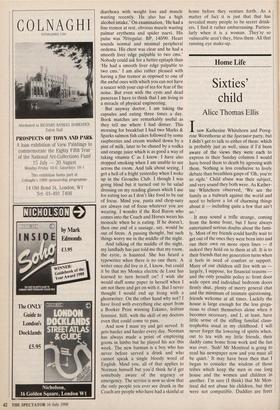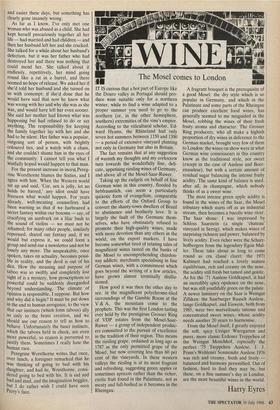Home Life
Sixties' child
Alice Thomas Ellis
It may sound a trifle strange, coming from the home front, but I have always entertained serious doubts about the fami- ly. Most of my friends could hardly wait to get out of the ones they were born into and run their own on more open lines — if indeed they hold on to them at all. It is to their friends that my generation turns when it feels in need of comfort or support. Many of our children still live with us largely, I suppose, for financial reasons and the only possible policy is: front door wide open and individual bedroom doors firmly shut, plenty of merry general chat and the minimum of intimate questioning, friends welcome at all times. Luckily the house is large enough for the less grega- rious to closet themselves alone when it becomes necessary, and I, at least, have little sense of the stifling familial claus- trophobia usual in my childhood. I will never forget the lowering of spirits when, out to tea with my little friends, their daddy came home from work and the fun was over. `Sssh! Mr Montreal is going to read his newspaper now and you must all be quiet.' It may have been then that I began to consider the wisdom of those tribes which keep the men in one long house and the women and children in another. I'm sure (I think) that Mr Mon- treal did not abuse his children, but they were not compatible. Daddies are freer and easier these days, but something has clearly gone insanely wrong.
As far as I know, I've only met one woman who was abused as a child. She had kept herself precariously together all her life — had married and had children — and then her husband left her and she cracked. She talked for a while about her husband's defection, but it was her father who had destroyed her and there was nothing that could mend her. She talked about it endlessly, repetitively, her mind going round like a rat in a barrel, and there seemed no hope of release. We asked her if she'd told her husband and she turned on us with contempt: if she'd done that he would have said that now he knew what was wrong with her and why she was as she was, and would have left her even sooner. She said her mother had known what was happening but had refused to do or say anything. The responsibility for keeping the family together lay with her and she had to be silent. Her father was a popular, outgoing sort of person, with brightly coloured ties, and a watch with a chain, and she couldn't shame him in the eyes of the community. I cannot tell you what I wistfully hoped would happen to that man.
For the present increase in incest Pereg- rine Worsthorne blames the Sixties, and I agree with him. When the Western world sat up and said, `Cor, sex is jolly, let no holds be barred,' any idiot could have foreseen what would happen. For years already, well-meaning counsellors had been warning us that if we harboured a secret fantasy within our bosoms — say, of crucifying an aardvark on a lilac bush to the sound of violins — we must not be ashamed; for many other people, similarly repressed, shared our fantasy and, if we would but express it, we could form a group and send out a newsletter and not be lonely any more. The unspeakable, once spoken, takes on actuality, becomes possi- ble in reality, and the devil is out of his den. How the meaning and purpose of taboo was so swiftly and completely lost sight of is a mystery, how proscriptions so powerful could be suddenly disregarded beyond understanding. The climate of opinion is responsible, I suppose. But how and why did it begin? It must be put down in the end to human arrogance, to the view that our instincts (which form taboos) ally us only to the brute creation, and we should use our reason to tell us how to behave. Unfortunately the baser instincts, which the taboos held in check, are even more powerful, so reason is perverted to justify them. Sometimes I really hate the human race.
Peregrine Worsthorne writes that once, over lunch, a foreigner remarked that he was thinking of going to bed with his daughter, and had he, Worsthorne, consi- dered going to bed with his. It is sad and bad and mad, and the imagination boggles, but I do rather wish I could have seen Perry's face.



















































 Previous page
Previous page